Front Cover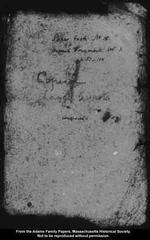
Paper book No. 16.
Journal Fragments. Vol. 3.
p. 51-100
[The preceding text was added in the handwriting of Charles Francis Adams]
Copied Large Quarto
[The preceding text was added in the handwriting of John Quincy Adams?]
compared.
[The preceding text was added in the handwriting of Charles Francis Adams]
Inside Front Cover
Page 1
1771 JANY. 10 THURSDAY.
Dined at the Honble. John Ervings, with Gray, Pitts, Hancock, Adams, Townsend, J. Erving Jur., G. Erving, Boardman. We had over the Nominations of Nat. Hatch to be judge of the common Pleas, and Ed. Quincy to be a justice of the Quorum, and H. Grays Story of a Letter from a repentant Whigg to him.
H. Gray. "The general Court is a good School for such Conversation as this"-i.e. double Entendre, Affectation of Wit-Pun-Smut, or at least distant and delicate Allusions to what may bear that Name.
Gray said He could sometimes consent to a Nomination when he could not Advise to it. And says he I can illustrate it to you Mr. Hancock. -- Suppose a young Gentleman should ask his Father's Consent that he should marry such a young Woman, or a young Lady should ask her father's Consent that she should marry such a young Man. The Father says I cant advise you, to have a Person of his or her Character, but if you have a Desire, I wont oppose it. You shall have my Consent. -Now M r. Hancock I know this Simile will justify the Distinction to a young Gentleman of your Genius.
A light brush happened too between Pitts and Gray. Pitts hinted something about the strongest Side. Gray said, there were 2 or 3 Of Us last May, that were Midwives, I kn
[know].
Page 2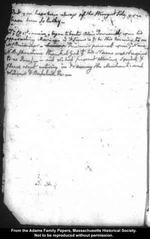
But you have been always of the strongest side, you have been so lucky.
When the Co. [Company] 1st. came in, they began to banter Blair Townsend, upon his approaching Marriage which it seems is to be this Evening, to one Mrs. Brimmer. [illegible] Treasurer punned upon the Name. (N.B. Shenstone thanked God that his Name was obnoxious to no Pun). And We had frequent Allusions, Squints, and Fleers about entering in &c. among the Merchants and Widowers and Bachelors, &c.
Page 3
FRYDAY FEBY. 7 [i.e. 8?]. 1771.
Met a Committee of the House at the Representatives Room, to consider of a Plan for a society for encouraging Arts, Agriculture, Manufactures and Commerce, within the Province .
Such a Plan may be of greater Extent and Duration than at first We may imagine. It might be usefull at any Time. There are in this Prov. [Province] natural Productions eno. Hemp, Silk, and many other Commodities might be introduced here, and cultivated for Exportation. The Mulberry Tree succeeds as well in our Climate and Soil, as in any.
1771. FEBY. 12.
At a Time, when the Barriers against Popery, erected by our Ancestors, are suffered to be destroyed, to the hazard even of the Protestant Religion: When the system of the civil Law [illegible] which has for so many so many Ages and Centuries, been withstood by the People of England, is permitted to become fashionable: When so many Innovations are introduced, to the Injury of the our Constitution of civil Government: it is not surprizing that the great Securities of the People, should be invaded, and their fundamental Rights, drawn into Question. While the People of all the other great Kingdoms in Europe, have been insidiously deprived of their Liberties, it is not unnatural to expect that such as are interested to introduce Arbitrary Government
Page 4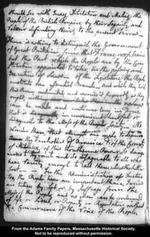
should see with Envy, Detestation and Malice, the People of the British Empire, by their Sagacity and
Valour defending theirs, to the present Times.
There is nothing to distinguish the Government of Great Britain, from that [of] France, or of Spain, but the Part which the People are by the Constitution appointed to take, in the passing and Execution of Laws. Of the Legislature, the People constitute one essential Branch-And while they hold this Power, unlimited, and exercise it frequently, as they ought, [nothing can ever take Place in the?] no Law can be made and continue long in Force that is disagreable inconvenient, hurtful, or disagreable to the Mass of the People society. No Wonder then, that attempts are made, to deprive them the Freeholders of America and of the County of Middlesex, of this troublesome Power, so dangerous to Tyrants and so disagreable to all who have Vanity enough to call themselves the better Sort. -- In the Administration of justice too, the People have an important Share. Juries are taken by Lot or by Suffrage from the Mass of the People, and no Man can be condemned of Life, or Limb, or Property or Reputation, without the Concurrence of the Voice of the People.
Page 5
As the Constitution requires, that, the popular Branch of the Legislature, should have an absolute Check so as to put a peremptory Negative upon every Act of the Government, so it requires that the [same?] common People should have as compleat a Controul, as decisive a Negative, in every judgment of a Court of Judicature. No Wonder then that the same restless Ambition, the same [of ] aspiring Minds, which areis endeavouring to lessen or destroy the Power of the People in the Legislation, should attempt to lessen or destroy it, in the Execution of Lawes. The Rights of Juries and of Elections, were never attacked singly in all the English History. The same Passions which have disliked one have detested the other, and both have always been exploded, mutilated and or undermined together.
The british Empire has been much allarmed, of late Years, with Doctrines concerning juries, and their Powers and Duties, which have been said in Printed Papers and Pamphlets to have been delivered from the highest Trybunals of Justice. Whether these Accusations are just or not, it is certain that many Persons are misguided and deluded by them, to such a degree, that we often hear in Conversation Doctrines advanced for Law, which if true, would render juries a mere Ostentation and Pagentry and the Court absolute judges of Law and [fact.]
Page 6
It cannot therefore be an unseasonable Speculation to examine into the real Powers and Duties of Juries, both in Civil and Criminal Cases, and to discover
the Boundary the important Boundary between the Power of the Court and that of the jury, both in Points of Law and of Fact.
Every intelligent Man will confess that Cases frequently occur, in which it would be very difficult for a jury to determine the Question of Law. Long Chains of intricate Conveyances; obscure, perplext and embarrassed Clauses in Writings: Researches into remote Antiquity, for Statutes, Records, Histories, judicial Decisions, which are frequently found in foreign Languages, as Latin and French, which may be all necessary to be considered, would confound a common Jury and a decision by them would be no better than a Decision by Lott. But it will by no Means follow from them, that the Jury
Page 7
And indeed Juries are so sensible of
[this] and of the great Advantages the judges have
[to] determine such Questions, that, as the Law has given them the Liberty of finding the facts specially and
Submitting the Law praying the Advice of the Court in the Matter of Law, they very seldom neglect to do it
when recommended to them, or when in any doubt of the Law. But it will by no Means follow from thence, that they are under any legal, or moral or divine Obligation to find a Special Verdict where they themselves are in no doubt of the Law.
The Oath of a Juror in England, is to determine Causes "according to your Evidence"- In this Province "according to Law and the Evidence given you." It will be readily agreed that the Words of the Oath at Home, imply all that is expressed by the Words of the Oath here. And whenever a general Verdict is found, it assuredly determines both the Fact and the Law.
It was never yet disputed, or doubted, that a general Verdict, given under the Direction of the Court in Point of Law, was a legal Determination of the Issue. Therefore the jury have a Power of deciding an Issue upon a general Verdict. And if they have, is it not an Absurdity to suppose that the Law would oblige them to find a Verdict according to the Direction of the Court, against their own Opinion, Judgment and Conscience.
Page 8
[It] has already been admitted to be most advisable for the jury to find a Special Verdict where they are in doubt of the Law. But, this is not often the Case-1000 Cases occur in which the Jury would have no doubt of the Law, to one, in which they would be at a Loss. The general Rules of Law and common Regulations of Society, under which ordinary Transactions arrange themselves, are well enough known to ordinary Jurors. The great Principles of the Constitution, are intimately known, they are sensibly felt by every Briton-it is scarcely extravagant to say, they are drawn in and imbibed with the Nurses Milk and first Air.
Now should the Melancholly Case arise, that the judges should give their Opinions to the jury, against one of these fundamental Principles, is a juror obliged to give his Verdict generally according to this Direction, or even to find the fact specially and submit the Law to the Court. Every Man of any feeling or Conscience will answer, no. It is not only his right but his Duty in that Case to find the Verdict according to his own best Understanding, Judgment and Conscience, tho in Direct opposition to the Direction of the Court.
Page 9
A religious Case might be put of a Direction against a divine Law.
The English Law obliges no Man to decide a Cause upon Oath against his own judgment, nor does it oblige any Man to take any Opinion upon Trust, or to pin his faith on the sleve of any mere Man.
THURDSDAY FEBY. 14. 1771
Dined at Mr. Hancocks with the Members, Warren, Church, Cooper, &c. and Mr. Harrison and spent the whole Afternoon and drank Green Tea, from Holland I hope, but dont know.
FRYDAY [15 FEBRUARY]. EVENING.
Going to Mr. Pitts's, to meet the Kennebeck Company -- Bowdoin, Gardiner, Hallowell, and Pitts. There I shall hear Philosophy, and Politicks, in Perfection from H. -- high flying, high Church, high state from G. -- sedate, cool, Moderation from B. -- and warm, honest, frank Whiggism from P. I never spent an Evening at Pitts's. What can I learn tonight.
Came home and can now answer the Question. I learned nothing. The Company was agreable enough. -- Came home in great Anxiety and distress, and had a most unhappy Night -- never in more misery, in my whole Life -- God grant, I may never see such another Night.
Page 10
SATURDAY. FEBY. 16.
Have had a pensive day.
Page 11
1772. NOVR. 21.
Next Tuesday I shall remove my Family to Boston, after residing in Braintree about 19 Months. I have recovered a Degree of Health by this Excursion into the Country, tho I am an infirm Man yet. I hope I have profited by Retirement and Reflection! -- and learned in what manner to live in Boston! How long I shall be able to stay in the City, I know not; if my Health should again decline, I must return to Braintree and renounce the Town entirely. I hope however to be able to stay there many Years! To this End I must remember Temperance, Exercise and Peace of Mind. Above all Things I must avoid Politicks, Political Clubbs, Town Meetings, General Court, &c. &c. &c.
I must ride frequently to Braintree to inspect my Farm, and when in Boston must spend my Evenings in my Office, or with my Family, and with as little Company as possible.
Pages 12 - 47
[Blank pages -- no images available]
Page 48
Page 49
1771. [ca. 20] JULY.
Tuesday went to Boston with my Wife, and the next day to Commencement at Cambridge, was only at 3 Chambers -- Palmers, Frenches and Rogers's.
1771. JULY 22D. MONDAY.
After rambling about my Farm and giving some Directions to my Workmen I went to Boston. There soon came into my Office, Ruddock and Story. It seems that Andrew Belchers Widow has sued Story as
[illegible] Deputy Register of the Admiralty under her Husband in his Lifetime, and Ruddock as his Bondsman,
for upon the Bond given for the
faithfull Discharge of his Office. Three or 400 st. of the Kings third of a Seizure is not accounted for
[illegible] and Ruddock is in Trouble. This Ruddock is as unique a Character as any of his Age-a finished Example of self Conceit, and Vanity. -- "I am plunged! I never was concerned in any Affair before, that I could not have any Thoughts of my own upon.it. I know there are several Laws-by one Law the Sherriffs Bonds are not to be put in Suit, after 2 Years, and the Treasurers are limited to 3 Years, but whether these Precedents will govern this Case I cant tell. I consulted Mr. Pratt, once about an Affair: and he advised me to do something. I told him I was of a different opinion. Every Line in his face altered, when I said this. -- You are
Page 50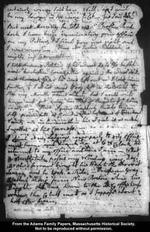
certainly wrong said he. -- Well, says I,
you'l be my Lawyer, when We come to Court. -- Yes said he. -- But next Morning he told me "Brother Ruddock I have been ruminating your Affair on my Pillow, and I find You was right, and I was wrong." -Thus Mr. Justice Ruddock is mighty in Counsell.
"I told Andrew Belcher, if he would not do so and so, he should never be chosen Counsellor again. He would not do it, and the next Year he was left out. I told him further, that I would not except of any Post in the World to stop my Mouth about Liberty, but I would write home and get away his Post of Register of the Admiralty."-Thus Squire Ruddock thinks himself powerfull at Court. The Instances of this Mans Vanity are innumerable-his Soul is as much Swollen as his Carcass.
I dined at my Lodgings, came early to my Office, went home and drank Tea at 6 O Clock and returned to my Office, and here I am. What a Multitude passes my Window every day! Mr. Otis's Servant brought his Horse to the Door at Seven, and he took a Ride. Treasurer Gray stalked along from New Boston, where his Daughter Otis lives, down to the B. [British] Coffeehouse where the Clubb meets, as I suppose about half after Seven.
Page 51
Spent an Hour or two in the Evening at Mr. Cranch's. Mr. Jo. Greenleaf came in, and Parson Hilyard [Hilliard] of Barnstable -- and we were very chatty.
Sister Cranch says, she has had an Opportunity of making many Observations, this Year at Commencement. And she has quite altered her Mind about dancing and dancing Schools, and Mr. Cranch seems convinced too, and says it seems, that all such as learn to dance are so taken up with it, that they cant be students. So that if they should live to bring up Billy to Colledge, they would not send him to dancing School-nor the Misses Betsy and Lucy neither. -- What a sudden, and entire Conversion is this! That Mrs. C. should change so quick is not so wonderfull, But that his mathematical, metaphysical, mechanical, systematical Head should be turned round so soon, by her Report of what she saw at Cambridge is a little remarkable. However the Exchange is for the better. It is from Vanity to Wisdom-from Foppery to Sobriety and solidity. I never knew a good Dancer good for any Thing else. I have known several Men of Sense and Learning, who could dance, Otis, Sewal, Paine, but none of them shone that Way, and neither of em had the more Sense or Learning, or Virtue for it.
I would not however conclude, peremptorily, against sending Sons or Daughters to dancing, or Fencing, or Musick, but had much rather they should be ignorant of em all than fond of any one of em.
Page 52
JULY 23D. TUESDAY.
The Court sat. Nothing remarkable. Dined at home at Brother Smiths, with Mr. Johnson. No Conversation memorable. Brother has 2 Dogs, 4. Rabbits, Six tame Ducks, a dozen Chickens, one Pidgeon, and some yellow Birds and other singing Birds, all in his little Yard.
It is a pitty that a Day should be spent, in the Company of Courts &c., and nothing be heard or seen, worth remembering. But this is the Case-of all that I have heard from judges, Lawyers, Jurors, Clients, Clerks, I cant recollect a Word, a Sentence, worth committing to writing.
Took a Pipe in the Beginning of the Evening with Mr. Cranch and then supped with Dr. Warren.
The Indian Preacher cryed good God! -- that ever Adam and Eve should eat that Apple when they knew in their own Souls it would make good Cyder.
Page 53
JULY 24. WEDNESDAY.
Dined at home, i.e. at my Brother Smiths with one Payson, a Man who now lives at Milton where Coll. [illegible] Gooch lived, and who married a Sister of David Wyers Wife. He had an Horse to sell, part English Bred, of Brig. Ruggles's raising-a young Horse, very firm and strong-good in a Chaise &c. We tryed him in a Saddle and in a Chaise too. Brother bought him. Spent the Evening at S. Quincys, with Deacon Storer and J. F. and H. Green about their Cases, in Consultation.
JULY 25. AND 26. THURSDAY AND FRYDAY.
Both these Days spent in the Tryal of Mr. Otis's Case vs. Mr. Robinson.
JULY 27. SATURDAY.
The Jury this Morning delivered their Verdict, for 2000 Sterling Damages, and Costs. -- I have spent this Morning in reading the Centinells. There is a profuse Collection of Knowledge in them, in Law, History, Government, that indicates to me the only Author, I think. A great Variety of Knowledge.
The Subject of the Governors Independency, is a serious, and momentous Thing a dangerous, and momentous Thing. It deserves the utmost Attention.
Page 54
Page 55
1771. AUG. 8 [i.e. 9?]. FRYDAY.1
Have loitered at home the most of the past Week, gazing at my Workmen. I set
'em upon one Exploit, that pleases me much. I proposed ploughing up the Ground in the Street along my Stone Wall opposite to Mr. Jos. Fields, and carting the Mould into my Cow Yard. A few Scruples, and Difficulties were started but these were got over -and Plough, Cart, Boards,
Shovells, Hoes, &c. were collected, and We found it
easyly ploughed by one Yoke of Oxen, very easy to shovel into the Cart, and very easily spread in the Yard. It was broke entirely to Pieces, and crumbled like dry Snow or indian meal in the Cow Yard. It is a Mixture of Sand, of Clay, and of the Dung of Horses, neat Cattle, Sheep, Hogs, Geese &c. washed down the whole length of Pens hill by the Rains. It has been a Century a Washing down, and is probably deep. We carted in 8 Loads in a Part of an Afternoon with 3 Hands besides ploughing it up, and 8 Loads more the next forenoon, with 2 Hands. I must plough up a long ditch the whole length of my Wall from N. Belchers to my House, and cart in the Contents. I must plough up the whole Balk from my Gate to Mr. Fields Corner, and cart in the Sward. I must
plough enlarge my Yard and plough up what I take in, and lay on that Sward; I must dig a Ditch in my fresh Meadow from N. Belchers Wall down to my Pond, and cart the Contents
Page 56
into my Yard. I must open and enlarge four Ditches from the Street down to Deacon Belchers Meadow, and cart in the Contents. I must also bring in 20 Loads of Sea Weed, i.e. Eel Grass, and 20 Loads of Marsh Mud, and what dead ashes I can get from the Potash Works and what Dung I can get from Boston, and What Rock Weed from Nat. Belcher or
else where. All this together with what will be made in the Barn and Yard, by my Horses, Oxen, Cows, Hogs, &c. and by the Weeds, that will be carried in from the Gardens, and the Wash and Trash from the House, in the Course of a Year would make a great Quantity of Choice manure.
J.Q. says Mr. O [Otis] was quite wild at the Bar Meeting-cursed the Servants for not putting 4 Candles on the Table, swore he could yet afford to have 4 upon his own-- &c. -- &c.
Page 57
AUGUST 13. OR 14TH. 1771.
Spent the Evening at Cordis's, the British Coffee house. -- In the front Room, towards the long Wharfe, where the Merchants Clubb has met this twenty Years. It seems there is a Schism in that Church -- a Rent in that Garment a Detachment -a Mutiny in that Regiment, and a large Detachment has decamped, and marched over the Way, to Ingersols.
This Evening The Commissary and Speaker, and Speaker and Commissary, Mr. Cushing was present. The Clerk of the House Mr. Adams, Mr. Otis, Mr. John Pitts, Dr. Warren, Mr. Molineux, Mr. Josa. Quincy, and myself were present.
AUG. 14. OR 15. WEDNESDAY.
Slept last Night, at Mr. Cranches, arose about Sunrise, and repaired to my Office. A fine, sweet, Morning fresh Morning.
Page 58
AUG. 20. 1771. TUESDAY.
At the Office.
AUGUST 22D. AND 23. THURSDAY AND FRYDAY.
At the Office. Mr. Otis's Gestures and Motions are very whimsical, his Imagination is disturbed-his Passions all roiled. His Servant, he orders to bring up his Horse, and to hold him by the Head at the Stone of his Door, an Hour before He is ready to mount. Then he runs into one Door and out at another, and Window &c. &c. &c.
Page 59
1771. NOVR. 5TH. TUESDAY.
At Salem. Fine Weather. Deacon Thurston of Rowley came in last Night, a venerable old Man, with his snowy, hoary Locks. Kent and the Deacon soon clashed upon Religion. -- Dont you think Sir, says the Deacon, We are here Probationers for Eternity?-No by no means says Kent. We are here Probationers from for the next State and in the next We shall be Probationers for the next that is to follow, and so on thro as many States as there are Stars or Sands, to all Eternity. You have gone thro several States already before this, one in the Womb, and one in your fathers Loyns. -- Ay, says the Deacon, Where do you get thisdont you believe the Scriptures.
I put in my Oar -- He made it Deacon out of the whole Cloth. It never existed out of his Imagination.
Kent. I get it from Analogy.
It is the delight of this Kents Heart to teaze a Minister or Deacon with his wild Conceits, about Religion.
1771. NOVR. 9. SATURDAY.
At Salem, all this Week at Court. Dined one day at C. [Chief] Justice Lyndes. All the rest of the Week till this day with the Court.
Dined this Day, spent the Afternoon, and drank Tea at Judge Ropes's, with Judges Lynde, Oliver and Hutchinson, Sewal, Putnam, and Winthrop.
Page 60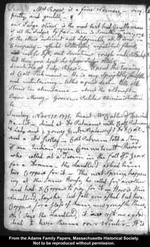
Mrs. Ropes is a fine Woman -- very pretty, and genteel.
Our Judge Oliver is the most best bred Gentleman of all the judges, by far. There is something in every one of the others indecent and disagreable, at Times in Company-affected Witticisms, unpolished fleers, coarse Jests, and sometimes rough, rude Attacks, but these you dont see escape Judge Oliver.
Drank Tea at Judge Ropes's. Spent the Evening at Colonel Pickmans. He is very sprightly, sensible and entertaining. Talks a great deal. Tells old Stories in abundance -- about the Witcraft [Witchcraft] -- Paper Money -- Governor Belchers Administration, &c.
SUNDAY NOVR. 10. 1771
Heard
Mr. Cutler of Ipswich Hamlet. Dined at Dr. Putnams with
Coll. Putnam and Lady and a young Gentlemen Nephews of the
Dr. and
Coll. -- and a Mrs. Scollay.
Coll. Putnam told a Story of an Indian upon Connecticutt River who called at a Tavern in the fall of the Year for a Dram. The Landlord asked him two Coppers for it. The next Spring, happening at the same House, he called for another and had 3 Coppers to pay for it. -- How is this, Landlord, says he, last fall you asked but two Coppers for a Glass of Rum, now you ask three. -- Oh! says the Landlord, it
is costs me a good deal to keep Rum over Winter. It is
Page 61
as expensive to keep an Hogshead of Rum over Winter as a Horse. -- Ay says the Indian, I cant see
thro that, He wont eat so much Hay --
may be He drink as much Water. -- This was
sheer Wit, pure Satyre, and
true Humour.
Humour, Wit, and
Satyr, in one very short Repartee.
Kent brought with him, Utopia, or the happy Republic, a Philosophical Romance, by Sir Thos. More, translated by Bp. Burnet. There is a sensible Preface by the Translator prefixed, and some Testimonies concerning More by great and learned Men of different Nations and Religions. Cardinal Pool [Pole], Erasmus, Jo. Cochleus, Paulus jovius, Jo. Rivius, Charles 5. &c. The Translation, I think is better than mine, which is by another Hand . The Romance is very elegant and ingenious-the fruit of a benevolent and candid Heart, a learned and strong Mind. The good Humour, Hospitality, Humanity, and Wisdom of the Utopians, is charming-their Elegance, and Taste is engaging -- their freedom from Avarice, and foppery, and Vanity is admirable.
Page 62
Page 63
1772. FEBY. 2D. SUNDAY.
Have omitted now for 3 months almost to keep any "Note of Time or of its Loss."
Thomas Newcomb dined with me. He says that Etter, the Stocking Weaver, told him about a fortnight ago, that he saw the Governor within these 3 Months, and told him, he hoped the People would be contented and easy now they had a Governor from among themselves. The Governor said, "there were some Discontents remaining occasioned by continual Clamours in the Newspapers, and that a great Part of those Clamours, came from his (Etters) Town, (Braintree)."
This was partly, I suppose, to pump Etter, and get something out of him, and partly to put Etter upon the right Scent, as the Governor thought, that he might hunt down the seditious Writer at Braintree. This Conversation shews that the Governor is puzzled And wholly ignorant of the real Writers that molest him. The Centinel has puzzled him.
Mr. Thomas Edwards our School Master and Mr. Joseph Crosby, a Senior Sophister at
Colledge, spent the Evening with me. Our Conversation
Page 64
was upon Austin, Tudor, Bulkley, Moreton
[Morton], Thayer, Angier -- Colonel Thayer, the Settlement of the Militia, Algebra, Fenning, Dr. Sanderson &c. &c. &c.
Edwards is ballancing in his Mind the several Professions, in order to choose one. Is at a Loss between Divinity and Law, but his Inclination is to the latter. Asked me to take him. I only answered there were such Swarms of young ones, that there was no Encouragement.
1772. FEBY. 4TH. TUESDAY.
Took a Ride in the Afternoon with my Wife and little Daughter to make a visit to my Brother. But finding him and Sister just gone to visit my Mother we rode down there, and drank Tea, altogether. Chatted about the new Promotions in the Militia, and speculated about the future Officers of this Company, upon supposition that the old Officers should resign-Billings, Brother, &c. &c.
It is curious to observe the Effect these little Objects of Ambition have upon Mens Minds. The Commission of a Subaltern, in the Militia, will tempt these little Minds, as much as Crowns, and Stars and Garters will greater ones. These are Things that strike upon vulgar, rustic Imaginations, more
Page 65
strongly, than Learning, Eloquence, and Genius, of which common Persons have no Idea.
My Brother seems to relish the Thought of a Commission, and if Rawson and Bass resign, I hope he will have one-under Billings.
1772. FEBY. 9. SUNDAY.
"If I would but go to Hell for an eternal Moment or so, I might be knighted." -- Shakespeare.
Shakespeare whose genius Spiritfull genius has thrown every Passions of the Heart and every Sentiment of the Mind
Shakespeare, that great Master of every Affection of the Heart and every Sentiment of the Mind as well as of all the Powers of Expression, is sometimes found to be fond of a certain pointed Oddity of Language, a certain Quaintness of Style, that is considered as an Imperfection, in his Character. An instance of the The Motto prefixed to this Paper, may be considered as an Example to illustrate this Observation.
Abstracted from the Point and Conceit in the Style, there is Sentiment enough in these few Words to fill Volumes a Volume. It is
Page 66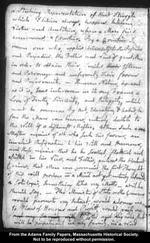
a striking Representation of that Struggle which I believe always happens, between Virtue and Ambition, when a Man first commences a Courtier. By a Courtier I mean one who applies himself to the Passions and Prejudices, the Follies and Vices of great Men in order to obtain their Smiles,
their Esteem and Patronage and consequently their
favours and Preferments. Human Nature, depraved as it is, has interwoven in its very Frame, a Love of Truth, Sincerity, and Integrity, which must be overcome by Art, Education, and habit, before the Man can become entirely ductile to the Will of a dishonest Master. When such a Master requires of all who seek his
favour, an implicit Resignation to his Will and
Humour, and these require that he be soothed, flattered and assisted in his Vices, and Follies, perhaps the blackest Crimes, that Men can commit, the first Thought of this will produce in a Mind not yet entirely debauched, a Soliloqui, something like my Motto -- as if he should say -- The Minister of State or the Governor would promote my Interest, would advance me to Places of
Honour and
Profitt, would raise me
and my family to Titles and Dignities that will be perpetuated in my family, in a Word
Page 67
would make the Fortune of me and my Posterity forever, if I would but comply with his Desires and become his Instrument to promote his Measures. -- But still I dread the Consequences. He requires of me, such
Complyances, such horrid Crimes, such a Sacrifice of my
Honour, my Conscience, my Friends, my Country, my God, as the Scriptures inform us must be punished with nothing less than Hell Fire, eternal Torment. And this is so unequal a Price to pay for the
Honours and Emoluments in the Power of a Minister or Governor, that I cannot prevail upon myself to think of it. The Duration of future Punishment terrifies me. If I could but deceive myself so far as to think Eternity a Moment only, I could comply, and be promoted.
Such as these are probably the Sentiments of a Mind as yet undifiled in the as yet pure, and undifiled in its Morals. And many and severe are the Pangs, and Agonies it must undergo, before it will be brought to yield entirely to Temptation. Notwithstanding this, We see every Day, that our Imaginations are so strong and our Reason so weak, the Charms of Wealth and Power are so en [enchanting]
Page 68
chanting, and the Belief of future Punishments so faint, that Men find Ways to persuade themselves, to believe any Absurdity, to submit to any Prostitution,
than rather than forego their Wishes and Desires. Their
Reasons become eloquent Advocate Reason becomes at last an eloquent Advocate on the Side of their Passions, and
[they] bring themselves to believe that black is white, that Vice is Virtue, that Folly is Wisdom and Eternity a Moment.
Page 69
The Brace of Adams's.
In the Year 1771 Spring of the Year 1771, several Messages passed between the Governor and the House of Representatives, concerning the Words that are commonly always used in Acts of Parliament, and which were used in all the Laws of this Province, till the Administration of Governor Shirley, "in General Court assembled and by the Authority of the same." These Messages Governor Shirley Saw and read in the Newspapers in whose Administration those Words were first omitted in Consequence of an Instruction to him, saw and read these Messages in the Newspapers, and enquired of somebody in Company with him at his Seat in Dorchester, who had raised those Words from Oblivion at this Time?-The Gentleman answered, the Boston Seat. -- Who are the Boston Seat? says the Governor. -- Mr. Cushing, Mr. Hancock, Mr. Adams and Mr. Adams says the Gentleman. -- Mr. Cushing I know, quoth Mr. Shirley, and Mr. Hancock I know, but where the Devil this Brace of Adams's came from, I cant conceive.
Page 70
Q. [Query.] Is it not a Pity, that a Brace of so obscure a Breed, should be the only ones to defend the Household, when the generous Mastiffs, and best blooded Hounds are all hushed to silence by the Bones and Crumbs, that are thrown to them, and even Cerberus himself is bought off, with a Sop?
The Malice of the Court and its Writers seems to be principally directed against these two Gentlemen. They have been stedfast and immoveable in the Cause of their Country, from the Year 1761, and one of them Mr. Samuel Adams for full 20 Years before. They have always since they were acquainted with each other, concurred in Sentiment that the Liberties of this Country had more to fear from one Man the present Governor Hutchinson than from any other Man, nay than from all other Men in the World. This Sentiment was founded in their Knowledge of his Character, his unbounded Ambition and his unbounded Popularity. This Sentiment they have always freely, tho decently, expressed in their Conversation and Writings,
Page 71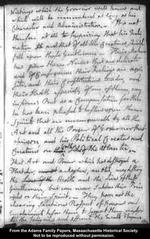
Writings which the Governor well knows and which will be remembered as long as his Character and Administration. It is not therefore at all
surprizing that his Indignation and that of all his Creatures should fall upon those Gentlemen. Their Maker has given them Nerves that are delicate, and of Consequence their Feelings are exquisite, and their Constitutions tender, and their Health especially of one of them, very infirm: But as a Compensation for this he has been pleased to bestow upon them Spirits that are unconquerable by all the Art and all the Power of Governor Hutchinson, and his Political Creators and Creatures on
this both Sides of the Atlantic. That Art and Power which has destroyed a Thatcher,
and a a Mayhew, an Otis, may destroy the
Lives of th Health and the Lives of these Gentlemen, but can never subdue their Principles or their Spirit. They have not the
chearing salubrious Prospect of
Honours and Emoluments before them, to support them under all the Indignities and Affronts, the Insults and Injuries,
Page 72
the Malice and Slander, that can be thrown upon Men, they have not even the Hope of those Advantages that the suffrages of the People only can bestow, but they have a Sense of
Honour and a Love of their Country, the Testimony of a good Conscience, and the Consolation of
Phylosophy, if nothing more, which will certainly support them in the Cause of their Country, to their last Gasp of Breath whenever that may happen.
1772. FEBY. 10. MONDAY.
Went to Boston to the Court of Admiralty, and returned at Night. I went upon the first Appeal that has been yet made and prosecuted before Judge Auchmuty, and as it is a new Thing the Judge has directed an Argument, and a Search of Books concerning the Nature of Appeals by the civil Law. I found Time to look into Calvins Lexicon Title Appellatio and Provocatio, and into Maranta, who has treated largely of Appeals. Borrowed Ayliff, but there is no Table and could find nothing about the Subject. Domat I could not find.
Page 73
[NOTES FOR AN ORATION AT BRAINTREE, SPRING 1772.]
The Origin, the Nature, the Principles and the Ends of Government, [illegible] in all Ages, the ignorant as well as the enlightened, and in all Nations, the barbarous as well as civilized, have employed the Wits of [illegible] ingenious Men.
The Magi, the Mufti, the Bramins, and Brachmans, Mandarines, [illegible] Rabbies, [illegible] Philosophers, Christian Divines, Schoolmen, Hermits, Legislators, Politicians, Lawyers, have [illegible] made these the subjects of their Enquiries and Reasonings. There is nothing too absurd, nothing too enthusiastical or superstitious, nothing too wild or whimsical, nothing too prophane or impious, to be found among such Thinkers, upon such Subjects. Any Thing which subtelty could investigate or imagination conceive, would serve for an Hypothesis, to support a System, excepting only what alone can support the System of Truth-Nature, and Experience.
Page 74
The Science of Government, like all other Sciences, is best pursued by Observation And Experiment-Remark the Phenomina of Nature, and from these deduce the Principles and Ends of Government.
Men are the Objects of this Science, as much as Air, Fire, Earth and Water, are the Objects of Phylosophy, Points, Lines, Surfaces and Solids of Geometry, or the Sun, Moon and Stars of Astronomy. Human Nature therefore and human Life must be carefully observed and studied. Here we should spread before Us a Map of Man-view him in different Soils and Climates, in different Nations and Countries, under different Religions and Customs, in Barbarity and Civility, in a State of Ignorance and enlightened with Knowledge, in Slavery and in freedom, in Infancy and Age.
He will be found, a rational, sensible and social Animal, in all. The Instinct of Nature impells him to Society, and Society causes the Necessity of Government.
Page 75
Page 76
Page 77
Government is nothing more than the combined Force of Society, or the united Power of the Multitude who compose the Society, for the Peace, Order, Safety, Good and Happiness of the People, who compose the Society. There is no King or Queen Bee distinguished from all others, by the Size or Figure, or beauty and Variety of Colours, in the human Hive. No Man has yet produced any Revelation from Heaven in his favour, any divine Communication to govern his fellow Men. Nature throws us all into the World equall and alike. [illegible]
Nor has any Form of Government the Honour of a divine original or Appointment. The Author of Nature has left it wholly in the Choice of the People, to make what mutual Covenants, to [illegible] erect what Kind of Governments, and to exalt what Persons they please to power and dignities, for their own Ease, Convenience and Happiness.
Government being according to my Definition the collected Strength of all for the Good general Good of all,
Page 78
Legislators have devised a Great Variety of forms in which this Strength may be arranged.
There are only Three simple Forms of Government.
When the whole Power of the Society is either lodged in the Hands of the whole Society, the Government is called a Democracy, or the Rule of the Many.
When the Sovereignty, or Supreme Power is placed in the Hands of a few great, rich, wise Men, the Government is an Aristocracy, or the Rule of the few.
When the absolute Power of the Community is entrusted to the Discretion of one Man a single Person, the Government is called a Monarchy, or the Rule of one, in this Case the whole Legislative and Executive Power is in the Breast of one Man.
There are however these two other Kinds of Monarchies. One is when the Administration supreme Power is not committed in a single Person but in the Laws, the Administration being committed solely to the Prince.
Another Kind is a limited Monarchy, where the Nobles or the Commons or both have a
Page 79
Check upon all the Acts of Legislation of the Prince.
There is an indefinite Variety of other Forms of Government, occasioned by different Combinations and of the Powers of Society, and different Inter mixtures of these Forms of Government, one with another.
The best Governments of the World have been mixed.
The Republics of Greece, Rome, Carthage, were all mixed Governments. The English, Dutch and Swiss, enjoy the Advantages of mixed Governments at this Day.
Page 80
Sometimes Kings have courted the People in Opposition to the Nobles. At other Times the Nobles have united with the People in Opposition to Kings. But Kings and Nobles have much oftener combined together, to crush, to humble and to Fleece the People.
But this is an unalterable Truth, that the People can never be enslaved but by their own Tameness, Pusillanimity, Sloth or Corruption.
They may be deceived, and their Ignorance Symplicity, Ignorance, and Docility render them frequently liable to deception. And the And of this, the aspiring, designing, ambitious few are very sensible. He is the Statesman [illegible] qualifyed by Nature to scatter Ruin and Destruction in his Path who by deceiving a Nation can render Despotism desirable in their Eyes and make himself popular in Undoing.
Page 81
Page 82
The Preservation of Liberty depends upon the intellectual and moral Character of the People. As long as Knowledge and Virtue are diffused generally among the Body of a Nation, it is impossible they should be enslaved. This can be brought to pass only by debasing their Understandings, or by corrupting their Hearts.
What is the Tendency of the late Innovations? The Severity, the Cruelty of the late Revenue Laws, and the Terrors of the formidable Engine, contrived to execute them, the Court of Admiralty? Is not the natural and necessary Tendency of these Innovations, to introduce dark Intrigues, Insincerity, Simulation, Bribery and Perjury, among Custom house officers, Merchants, Masters, Mariners and their Servants?
What has is the Tendency, what has been the Effect of introducing a standing Army into our Metropolis? Have we not seen the most horrid Rancour, furious Violence, infernal Cruelty, shocking Impiety and
Page 83
Profanation, and shameless, abandoned Debauchery, running down the Streets like a Stream?
Page 84
Liberty, under every conceivable Form of Government is always in Danger. It is so even under a simple, or perfect Democracy, more so under a mixed Government, like the Republic of Rome, and still more so under a limited Monarchy.
Ambition is one of the more ungovernable Passions of the human Heart. The Love of Power, is insatiable and uncontroulable.
Even in the simple Democracies of ancient Greece, jealous as they were of Power, even their Ostracism could not always preserve them from the grasping Desires and Designs of their great Men, from the overbearing Popularity, of their great Men.
Even Rome, in her wisest and most virtuous Period, from the Expulsion of her Kings to the Overthrow of the Commonwealth, was always in Danger from the Power of some and the Turbulence, Faction and Popularity of others.
Page 85
There is Danger from all Men. The only Maxim of a free Government, ought to be to trust no Man living, with Power to endanger the public Liberty.
In England, the common Rout to Power has been by making clamorous Professions of Patriotism, in early Life, to secure a great Popularity, and to ride upon that Popularity, into the highest Offices of State, and after they have arrived there, they have been generally found, as little zealous to preserve the Constitution, as their Predecessors whom they have hunted down.
The Earl of Strafford, in early Life, was a mighty Patriot and Anticourtier.
Sir Robert Walpole. Commited to the Tower the Father of Corruption.
Harley also, a great and bold Advocate for the Constitution and Liberties of his Country.
But I need not go to Greece or to Rome, or to
Page 86
Britain for Examples. There are Persons now living in this Province, who for a long Course of their younger Years, professed and were believed to be the Guardian
Angells of our civil and Religious Liberties, whose latter Conduct
has been, since they have climbed up by Popularity to Power, has exhibited as great a Contrast to their former Professions and Principles, as ever was seen in a Strafford, an Harley, or a Walpole.
Be upon your Guard then, my Countrymen.
We see, by the Sketches I have given you, that all the great Kingdoms of Europe have once been free. But that they have lost their Liberties, by the Ignorance, the Weakness, the Inconstancy, and Disunion of the People. Let Us guard against these dangers, let us be firm and stable, as wise as Serpents and as harmless as Doves, but as daring and intrepid as Heroes. Let Us cherish the Means of Knowledge-our schools and Colledges-let Us cherish our Militia, and encourage military Discipline and skill.
Page 87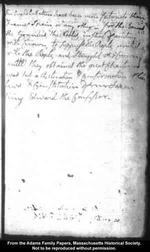
The English Nation have been more fortunate than France, Spain, or any other -- for the Barons, the Grandees, the Nobles, instead of uniting with [the] Crown, to suppress the People, united with the People, and struggled vs. the Crown, untill they obtained the great Charter, which was but a Restoration and Confirmation of the Laws and Constitution of our Saxon King Edward the Confessor.
Page 88
Liberty depends upon an exact Ballance, a nice Counterpoise of all the Powers of the state.
When the Popular Power becomes grasping, and eager after Augmentation, or for Amplification, beyond its proper Weight, or Line, it becomes as dangerous as any other. Sweeden is an Example.
Page 89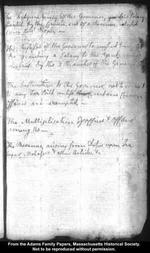
The Independency of the Governor, his Salary granted by the Crown, out of a Revenue extorted from this People.
The Refusal of the Governor to consent to any Act for granting a Salary to the Agent, unless chosen by the 3 Branches of the General Court.
The Instruction to the Governor, not to consent to any Tax Bill unless the certain Crown Officers are exempted.
The Multiplication of Offices and Officers among Us.
The Revenue, arising from Duties upon Tea, Sugar, Molasses and other Articles, &c.
Page 90
It is the popular Power, the democraticall Branch of our Constitution that is invaded.
If K. [King], Lords and Commons, can make Laws to bind Us in all Cases whatsoever, The People here will have no Influence, no Check, no Power, no Controul, no Negative.
And the Government we are under, instead of being a mixture of Monarchy, Aristocracy and Democracy, will be a Mixture only of Monarchy and Aristocracy. For the Lords and Commons may be considered equally with Regard to Us as Nobles, as the few, as Aristocratical Grandees, independent of Us the People, uninfluenced by Us, having no fear of Us, nor Love for Us.
Page 91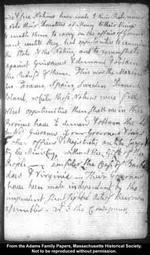
Wise and free Nations have made it their Rule, never to vote their Donations of Money to their Kings to enable them to carry on the Affairs of Government, untill they had Opportunities to examine theState of the Nation, and to remonstrate against Grievances and demand and obtain the Redress of them. This was the Maxim in France, Spain, Sweeden, Denmark, Poland, while those Nations were free. What opportunities then shall we in this Province have to demand and obtain the Redress of Grievances, if our Governors and judges and other Officers and Magistrates are to be supported by the Ministry, without the Gifts of the People. -- Consider the Case of Barbadoes and Virginia. Their Governors have been made independent by the imprudent shortsighted Acts of their own Assemblies. What is the Consequence
Pages 92 - 93
[Blank pages -- no images available]
Page 94
Page 95
FALMOUTH, CASCO BAY. JUNE 30TH. 1772. TUESDAY.
My Office at Boston will miss me, this day. It is the last day of Arresting for July Court. What equivalent I shall meet with here is uncertain.
It has been my Fate, to be acquainted, in the Way of my Business, with a Number of very rich Men -- Gardiner, Bowdoin, Pitts, Hancock, Rowe, Lee, Sargeant, Hooper, Doane. Hooper, Gardiner, Rowe, Lee, and Doane, have all acquired their Wealth by their own Industry. Bowdoin and Hancock received theirs by Succession, Descent or Devise.
Pitts by Marriage. But there is not one of all these, who derives more Pleasure from his Property than I do from mine. My little Farm, and Stock, and Cash, affords me as much Satisfaction, as all their immense Tracts, extensive Navigation, sumptuous Buildings, their vast Sums at Interest, and Stocks in Trade yield to them. The Pleasures of Property, arise from Acquision
[Acquisition] more than Possession, from what is to come rather than from what is. These Men feel their Fortunes. They feel the Strength and Importance, which their Riches give them in the World. Their Courage and Spirits
[illegible] are buoyed up, their Imaginations are inflated by them. The rich are seldom remarkable for Modesty, Ingenuity, or Humanity.
Page 96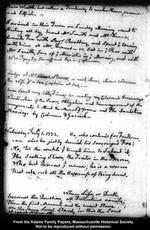
Their Wealth has rather a Tendency to make them penurious and selfish.
I arrived in this Town on Sunday Morning, went to Meeting all day, heard Mr. Smith and Mr. Deane. Drank Tea with Brother Bradbury, and spent the Evening with him at Mr. Deanes. Sat in the Pew with Mr. Smith, Son of the Minister in the Morning, and with Wm. Tyng Esq. Sherriff and Rep. [Representative] in the Afternoon.
Lodge at Mrs. [Stovers?] Stovers, a neat, clean, clever Woman, the Wife of a Sea Captain at Sea.
Have spent my idle Time, in reading my Clasmate Heminways Vindication of the Power, Obligation and Encouragement of the unregenerate to attend the Means of Grace -- and The clandestine Marriage by Colman and Garrick.
WEDNESDAY JULY 1. 1772.
He, who contends for Freedom,
can ne'er be justly deem'd his Sovereign's Foe:
No, 'tis the wretch that tempts him to subvert it,
The soothing Slave, the Traitor in the Bosom,
Who best deserves that name; he is a worm
That eats out all the Happiness of Kingdoms.
When Life, or Death,
becomes the Question, all Distinctions vanish;
Then the first Monarch and the lowest Slave
on the same Level Stand, in this the Sons
of equal Nature all.
Page 97
Pages 98 - 99
[Blank pages -- no images available]
Page 100
Page 101
1772. SEPTR. 22.
At Boston. Paid Doctr. Gardiner and took up my last Note to him. I have now got compleatly thro, my Purchase of Deacon Palmer, Coll. Quincy and all my Salt Marsh, being better than 20 Acres, and have paid 250 O.T. towards my House in Boston, and have better than 300 left in my Pockett. At Thirty Seven Years of Age, almost, this is all that my most intense Application to Study and Business has been able to accomplish, an Application, that has more than once been very near costing me my Life, and that has so greatly impaired my Health.
I am now writing in my own House in Q ueen Street, to which I am pretty well determined to bring my Family, this Fall. If I do, I shall bring them come with a fixed Resolution, to meddle not with public Affairs of Town or Province. I am determined, my own Life, and the Welfare of my whole Family, which is much dearer to me, are too great Sacrifices for me to make. I have served my Country, and her professed Friends, and at an immense Expense, to me, of Time, Peace, Health, and Money, and Preferment, both of which last have courted my Acceptance, and been inexorably refused, least I should be laid under a Temptation to forsake the Sentiments of the Friends of this Country. These last are such Politicians, as to bestow all their Favours upon their professed and declared Enemies. I will devote myself wholly to my private Business, my Office and my farm, and I hope to lay a Foundation for better Fortune to my Children, than has and an happier Life than has fallen to my Share.
Page 102
This [is] the last Training Day for the Year -- have been out to view the Regiment, the Cadets, the Grenadiers, the Train &c. -- a great Show indeed.
Page 103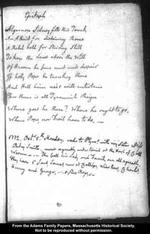
Epitaph.
Algernon Sidney fills this Tomb,
An Atheist for disdaining Rome
A Rebel bold for striving still
To keep the Laws above the Will
Of Heaven he sure must needs despair
If holy Pope be turnkey there
And Hell him ne'er will entertain
For there is all Tyrannick Reign
Where goes he then? Where he ought to go.
Where Pope, nor Devil have to do.
1772. OCTR. 5TH. MONDAY.
Rode to Plymouth with my Sister Miss Betsy Smith. Most agreably entertained at the House of Coll. Warren. The Colonel, his Lady and Family are all agreable. They have 5 Sons, James, now at Colledge, Winslow, Charles, Henry and George-5 fine Boys.
Page 104
1772. OCTR.
At Taunton. This Week has been a remarkable one.
Page 105
OCTR. 19. 1772. BOSTON.
The Day of the Month reminds me of my Birth day, which will be on the 30th. I was born Octr. 19. 1735. Thirty Seven Years, more than half the Life of Man, are run out. -- What an Atom, an Animalcule I am!-The Remainder of my Days I shall rather decline, in Sense, Spirit, and Activity. My Season for acquiring Knowledge is past. And Yet I have my own and my Childrens Fortunes to make. My boyish Habits, and Airs are not yet worn off.
Page 106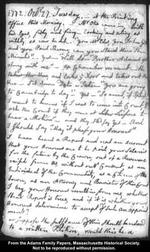
1772. OCTR. 27. TUESDAY.
At the Printing Office this Morning. Mr. Otis came in, with his
Eyes, fishy and fiery, looking and acting as wildly as ever he did. -- "You Mr. Edes, You John Gill and you Paul Revere, can you stand there Three Minutes." -- Yes. -- "Well do. Brother Adams go along with me." Up Chamber we went. He takes the Kee locks the Door and takes out the Kee. Sit down Tete a Tete. -- "You are going to Cambridge to day" -- Yes. -- "So am I, if I please. I want to know, if I was to come into Court, and ask the Court if they were at Liber Leisure to hear a Motion" -- and they should say Yes -- And I should say "May it please your Honours"
I have heard a Report and read an Account that your Honours are to be paid your Salaries for the future by the Crown, out of a Revenue raised from Us, without our Consent. As an Individual of the Community, as a Citizen of the Town, as an Attorney and Barrister of this Court, I beg your Honours would inform me, whether that Report is true, and if it is, whether your Honours determine to accept of such an Appointment?'
"Or Suppose the substance of this should be reduced to a written Petition, would this be a
Page 107
Contempt? Is mere Impertinence a Contempt?"
In the Course of this curious Conversation it oozed out that Cushing, Adams, and He, had been in Consultation but Yesterday, in the same Chamber upon that Subject.
In this Chamber, Otis was very chatty. He told me a story of Coll. Erving, whose Excellency lies, he says, not in military Skill, but in humbugging. Erving met Parson Morehead [Moorehead] near his Meeting House. You have a fine Steeple, and Bell, says he, to your Meeting House now. -- Yes, by the Liberality of Mr. Hancock and the Subscriptions of some other Gentlemen We have a very hansome and convenient House of it at last. -- But what has happened to the Vane, Mr. Morehead, it dont traverse, it has pointed the same Way these 3 Weeks. -- Ay I did not know it, I'l see about it. -- Away goes Morehead, storming among his Parish, and the Tradesmen, who had built the Steeple, for fastening the Vane so that it could not move. The Tradesmen were alarmed, and went to examine it, but soon found that the fault was not in the Vane but the Weather, the Wind having sat very constantly at East, for 3 Weeks before.
He also said there was a Report about Town that
Morehead had given Thanks publicly, that by the Generosity of Mr. Hancock, and some other Gentlemen,
Page 108
they were enabled to worship God as
genteely now as any other Congregation in Town.
After We came down Stairs, something was said about military Matters. -- Says Otis to me, Youl never learn military Exercises. -- Ay why not?-That You have an Head for it needs no Commentary, but not an Heart. -- Ay how do you know-you never searched my Heart. "Yes I have -- tired with one Years Service, dancing from Boston to Braintree and from Braintree to Boston, moaping about the Streets of this Town as hipped as Father Flynt at 90, and seemingly regardless of every Thing, but to get Money enough to carry you smoothly through this World."
This is the Rant of Mr. Otis concerning me, and I suppose of a thirds of the Town. -- But be it known to Mr. Otis, I have been in the public Cause as long as he,
'tho I was never in the General Court but one Year. I have sacrificed as much to it as he. I have never got
[my] Father chosen Speaker and Councillor by it, my Brother in Law chosen into the House and chosen Speaker by it, nor a Brother in Laws Brother in Law into the House and Council by it. Nor did I ever turn
Page 109
about in the House
[illegible] , betray my Friends and rant on the Side of Prerogative, for an whole Year, to get a father into a Probate Office, and a first justice of a Court of Common Pleas, and a Brother into a Clerks Office.
There is a Complication of Malice, Envy and jealousy in this Man, in the present disordered State of his Mind that is quite shocking.
I thank God my mind is prepared, for whatever can be said of me. The Storm shall blow over me in Silence.
Rode to Cambridge and made a Mornings Visit to Judge Trowbridge in his solitary, gloomy State. He is very dull, talks about retiring from Court. Says he cant fix his Attention as he could-is in doubt whether he ought to sit in a Capital Case, least he should omit something that is material-&c. &c.
Was inquisitive however, about Politicks and what the Town of Boston was likely to do about the Judges Salaries. Said he heard they were about to choose a Committee to wait upon the Court, to enquire of them &c. &c. Comparing this with Otis's distracted Proposal to me, about a Motion or Petition, I concluded that something of this Kind had been talked of in Town, 'tho I never heard a Hint of it from any but these two .
Trowbridge thought there never was a Time when
every Thing was so out of joint. Our general Court gave
Page 110
Cushing for a fortnights Work as much as the Judges for a Years. The Ministry gave 600 a Year to the Admiralty Judges, for doing no more Business than the Superior Court did in one Term,
'tho the latter had a
Controul over the former. For his Part he could not look upon it in any other Light than as an Affront. This is nearly the same that he said to
Coll. Warren. Attended Court, all Day, dined with the Judges &c. at Bradishes. Brattle was there and was chatty. Fitch came in blustering when Dinner was half over.
Page 111
1772. NOVR. 28 [i.e. 27?]. FRYDAY.
This Week vizt. last Tuesday my Family and Goods arrived at Boston where we have taken Possession of my House in Queen street where I hope, I shall live as long as I have any Connections with Boston.
This Day Majr. Martin came into the Office and chatted an Hour very sociably and pleasantly. He says that Politicks are the finest Study and science in the World, but they are abused. Real Patriotism or Love of ones Country is the greatest of moral Virtues, &c. He is a Man of Sense and Knowledge of the World. His Observation upon Politicks is just, they are the grandest, the Noblest, the most usefull and important Science, in the whole Circle.
A Sensible Soldier is as entertaining a Companion as any Man whatever. They acquire an Urbanity, by Travel and promiscuous Conversation, that is charming. This Major Martin has conversed familiarly in Scotland, in England, and in America, and seems to understand every thing very well Subject of general Conversation very well.
Page 112
I have now got through the Hurry of my Business. My Father in Law Mr. Hall and my Mother are well settled in my Farm at Braintree, the Produce of my Farm is all collected in, my own Family is removed and well settled in Boston, my Wood and Stores are laid in for the Winter, my Workmen are nearly all paid. I am disengaged from public Affairs, and now have nothing to do but to mind my Office, my Clerks and my Children.
But this Week which has been so agreable to me, in the Course of my own Affairs, has not been so happy for my Friends. My Brother in Law has failed in Trade, is confined to his House, unable to answer the Demands upon him, by some Thousands. A Miserable Prospect before him for himself, his Wife, Children, Father, Mother, and all his Friends. Beware of Idleness, Luxury, and all Vanity, Folly and Vice!
The Conversation of the Town and Country has been about the Judges strange Occurrence of last Week, a Piracy said to have been committed on a Vessell bound to Cape Cod, 3 Men killed, a Boy missing, and only one Man escaped to tell the News-a misterious, inexplicable Affair! About Wilkes's probable Mayoralty, and about the Salaries to the Judges. These are the 3 principal Topicks of Conversation at present.
Page 113
My Workmen have this day loaded my Brothers Boat with Horse dung from Bracketts stable. This is the 3d. Freight -- the first was 15 Load, the second 12 and this last 11, in all 38 Loads.
Pages 114 - 120
[Blank pages -- no images available]
Inside Back Cover
[Blank page -- no image available]
Back Cover
[Blank page -- no image available]

































































